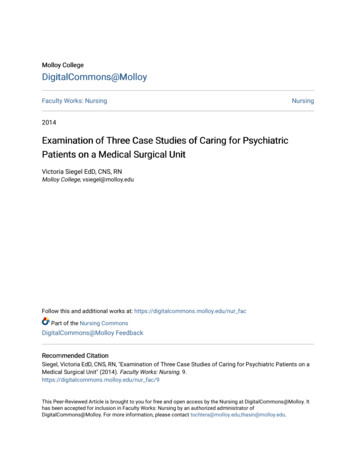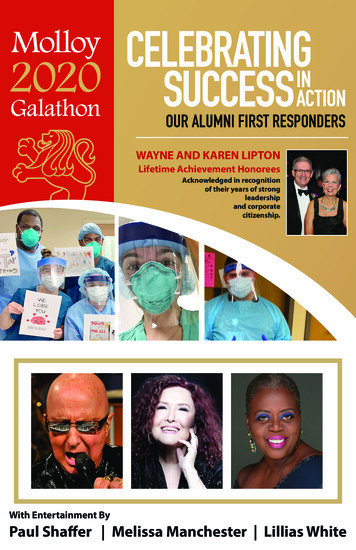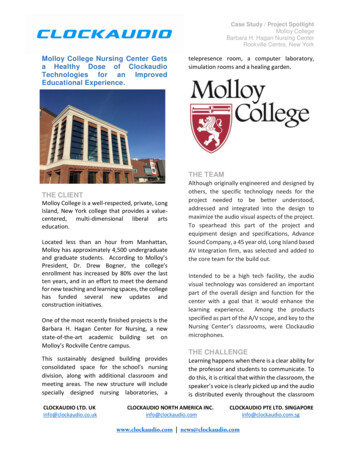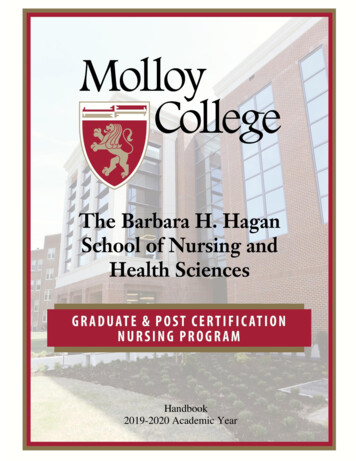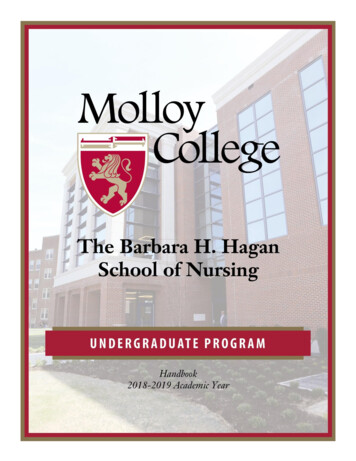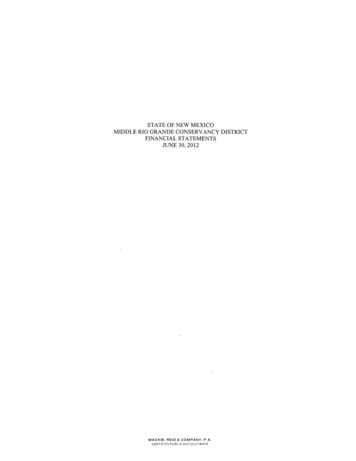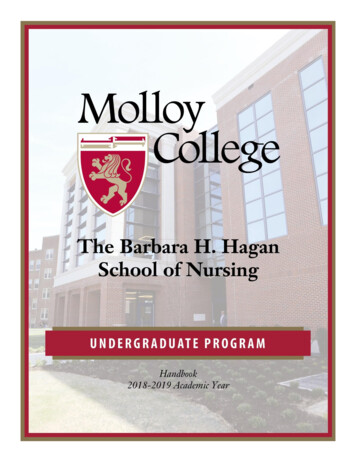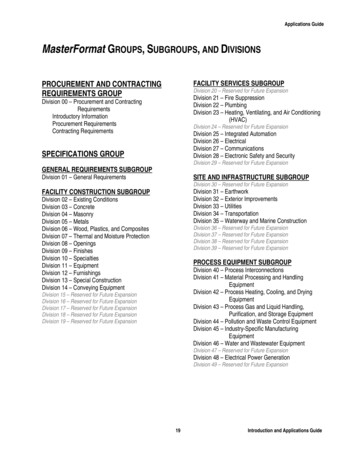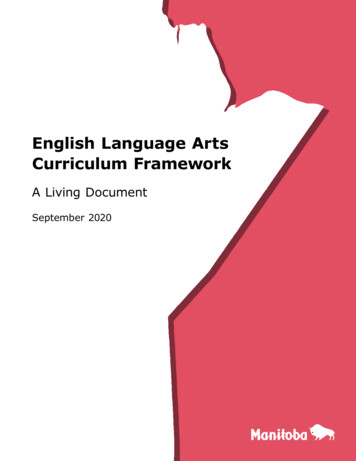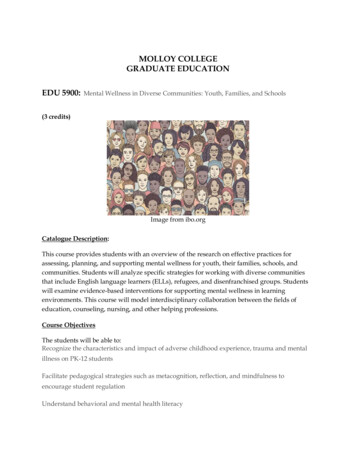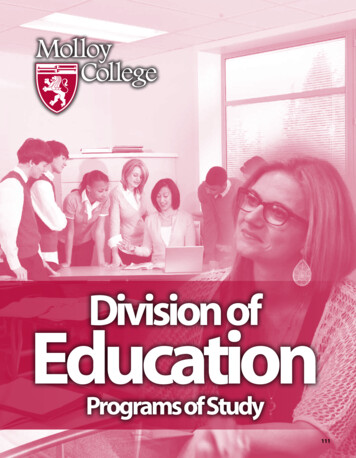
Transcription
Division ofEducationPrograms of Study111
Welcome to the Division of Educationfrom the Dean of the DivisionDear Teacher Candidates, Teachers and Colleagues,Welcome to the Graduate Program of the Division of Educationat Molloy College! By choosing to pursue graduate study inEducation at Molloy, you have selected a rigorous programwhich will lead to a rewarding career. Our Graduate Programsare made up of educators with vast experience at the childhoodand adolescent levels who are ready to share their expertisewith you and mentor you along your career path. Additionally,our programs are accredited by the prestigious Council for theAccreditation of Educator Preparation (CAEP).Since their inception, Molloy’s Graduate Education Programshave become well-respected throughout the educationalcommunity. Our programs lead to initial or professionalcertification in areas including early childhood, childhood,adolescence, special education, educational technology andTeaching English to Speakers of Other Languages (TESOL). We also offer dual degree programs leading to aBA/MS or a BS/MS degree and Post Master’s Degree Programs in TESOL and Special Education. Classroombased action research and other research opportunities are exciting components of our professionalcertificate programs. Initial certificate programs include supervised field experiences, which will help youput your theoretical knowledge into practice in actual classrooms.Our Doctoral Program in Education, known as “Educational Leadership for Diverse Learning Communities”leads to an Ed.D. Degree. This program has attracted talented individuals from a variety of fields who wish toimplement positive educational policy change and ensure educational equity for all learners.Regardless of the program you choose, Molloy faculty mentors will guide you along every step of theway. I am confident that you will find a stimulating academic environment in all our graduate classes, whichwill help you to further your professional growth. I wish you every success as you embark upon or continueyour professional training in our Graduate Education Program.Sincerely,Joanne O’Brien, Ed.D.Dean of the Divisionand Professor of Education1-888-4-MOLLOYwww.molloy.edu112
Welcome to theEducation Master’s and Post Master’sPrograms from the AssociateDeanandDirectorDear Teachers and Teacher Candidates:Welcome to the Graduate Education Program at Molloy College!Congratulations on your choice of a career in which you can change theworld -- one student at a time.The fact that you are reading this section of the catalog indicatesthat you are interested in our most noble profession, one which willallow you to truly make a difference. Founded by the Dominican Sistersof Amityville in 1955, Molloy College has from its beginning enjoyed anoutstanding reputation for educating teachers who are effective leadersin schools throughout Long Island and surrounding areas.Molloy’s Master of Science Degree offers twelve different programsincluding Early Childhood Education, Childhood Education, AdolescentEducation in biology, English, mathematics, social studies and Spanish,Special Education on both childhood and adolescent levels, Educational Technology PK-12, and Teaching English toSpeakers of Other Languages in grades PreK-12, which provide you with the opportunity to match your special interestsand talents to the needs of the students you will teach. You also have the opportunity to combine courses and receivedual certification or to extend your existing certification through our Post Masters Advanced Certificate Programs.Graduate Education professors possess the highest academic credentials, are experienced in research and publishing,and bring many years of classroom and administrative experience to enhance their teaching. They have your individualsuccess as their goal. Your personal advisor will be a full-time faculty member with expertise and experience in yourcertification area. Class size is limited to facilitate interactive learning and personal attention.We are extremely proud of our graduates who represent us as an outstanding quality program, accredited not onlyby Middle States Association of Colleges and Secondary Schools, but also by the Council for Accreditation of EducatorPreparation. If you are seeking a challenging and rewarding life, be it your initial position or a career change from anotherfield, I invite you to take that first exciting step on your successful journey here at Molloy College. I welcome you to theDominican heritage of excellence in a values-centered teacher education program.Audra Cerruto, Ph.D.Associate Dean and DirectorGraduate Education Programs1-888-4-MOLLOYwww.molloy.edu113
Education Master’sProgramsK326 Kellenberg Hall516.323.3115K217 Kellenberg Hall516.323.3110Joanne O’Brien, Ed.D., Dean of the Division of EducationAudra Cerruto, Ph.D., Associate Dean and Director GraduatePrograms in EducationVincent Tumminello, M.S., Coordinator of Graduate Programsand Certification OfficerA select number of courses are also offered at the followingextension site:St. John the Baptist High School (West Islip)These credit bearing courses are included in the degreerequirements for the Master of Science Degrees and are taught byprofessors who teach at Molloy College following the same syllabias courses taught at the main campus.Division of Education —Philosophy and ConceptualFrameworkMissionProfessors Emeriti: Samuel Carpentier, Bernadette M. Donovan,O.P., Karen A. Edwards, Charles Howlett, Peter LynchFounded in the Catholic tradition and committed to the Dominicanideals of truth, academic excellence and openness to diverseworld-views, the Professional Education Unit of Molloy Collegeprovides a value-centered experience that embraces intellectual,ethical, spiritual and social development in an environmentwhere academic freedom, a spirit of inquiry and respect for eachindividual’s worth and dignity prevail. The Professional EducationUnit at Molloy College is committed to the preparation ofoutstanding teaching professionals with the dispositions, skills andknowledge required to meet the needs of all students they havethe privilege to teach. It is the responsibility and goal of the facultyto guide students through pedagogically valid and intenselychallenging learning and service experiences that empowerteacher candidates to serve as leaders in schools and communities.Professors: Michelle Chamblin, Audrey Cohan, Maria Dove, VickyGiouroukakis, Andrea Honigsfeld, Jacqueline Nenchin, JoanneO’Brien, Marjorie Schiering, Laura Shea-Doolan, Maureen T. WalshThis Conceptual Framework relates directly to Molloy College’sStrategic Plan and is supported by the four pillars of Dominican life:prayer, study, preaching and community that we interpret as:Eve Dieringer, Ed.D., Director of Clinical Experience andTeacher AssessmentJoanna Alcruz, Ph.D., CAEP CoordinatorCAEP Data Manager: Ellen HaroldComputer Lab Associates: Ellen Harold and Rickey MoroneyDean Emerita: Maureen T. WalshAssociate Professors: Patricia Hinds-Mason, Linda Kraemer, TriciaKress, Kevin Sheehan, Alexandria Wolochuk, O.P.Assistant Professors: Joanna Alcruz, Margaret Blair, AudraCerruto, Madeline Craig, Patricia N. Eckardt, Maria Esposito, CarrieMcDermott, Allison Roda, Mubina Schroeder, Francine WisnewskiAdjunct Assistant Professor: Debra LoVerdeAdjunct Instructors: Tracy Alesia, Mitchell Bickman, Mary Brower,Brian Ciampo, Stephen DiGiorgio, Xiomara Flowers, Robin Fruman,Erin Holtkamp, Gloria Joanne Kramer, Patrice Kuntzler, JasonManning, Rickey Moroney, Megan Pavlick, Lisa Peluso, MelaniePicchioni, Jessica Ryan,John Salvato, David Smith, Denise T. Smith,Catherine Turano,Please note that Molloy College has developed hybrid courses forsome graduate programs. A hybrid course combines face-to-faceclassroom instruction with online/distance learning. At Molloy,more than 50% of a hybrid course is scheduled in a traditionalclassroom environment and the remaining time is completedout of the classroom. Hybrid courses have been launched in theGraduate Education “core courses” required for all tracks. Thenumber of hybrid courses will increase in subsequent semesters. Spirituality and Reflection Research and Teaching Service CommunityCore Values and DispositionsThe Molloy College Teacher Education faculty has derived its visionfor the exemplary teacher from the College’s mission statement, thefour pillars of the Dominican tradition (spirituality and reflection,research and teaching, service, and community), comments andinput from the Professional Education Unit’s Advisory Boards.The teaching professionals who complete Molloy’s teacherpreparation programs are distinguished by their ability to exemplifyand promote core values in their own teaching. The Molloy TeacherCandidate: Believes that all children can learn Embraces and celebrates differences in learning styles,and values diversity and personal identitySuffolk Center and Extension Site Molloy College Graduate Education programs are offered at MolloyCollege Suffolk Center on Route 110 in Farmingdale.Embraces responsibilities and duties associated withdemocracy Evaluates and reflects on professional practice to makeinformed decisions regarding the use of technology in114
support of student learning and considers the social,ethical, legal and human issues surrounding the useof technology in the PK-12 schools and applies thoseprinciples in practice Approaches intellectual pursuits with integrity andopen-mindedness, and values educational theory andresearch to reflect productively on one’s own practice Celebrates pluralism and independence, and reflectsupon and evaluates the effects of social justice andinjustice Values and nurtures students’ intellectual and socialgrowth, and the pursuit of wisdom Assumes appropriate risk in advocating for studentsand others, and reflects on professional practice tomake informed decisions regarding the support ofstudent learning Demonstrates enthusiasm and passion for teachingand learning, and commitment to students and theirlearning Values assessment, which includes analysis andreflection, as a means to improve effective practice Celebrates respect for self, family, educative institutionsand community; values and encourages independenceand community including a spirit of cooperation; and,embraces and sustains a safe and nurturing learningenvironment Appreciates personal and professional empowermentand sense of self efficacy, and values skepticism, inquiryand higher order thinkingFor the Molloy community, teaching, when performed withintegrity and compassion, is both spiritual and transformative.Molloy teachers are characterized by their depth and breadth ofknowledge in the academic content areas and in professionaleducation, their ability to engage others as a community of learners,their enthusiasm for teaching and their commitment to becomereflective practitioners, as well as life-long learners. Therefore, theMolloy graduate can be described as a values-based professionalhelping students or groups of students to: Clarify for themselves the nature of their ownquestions, in terms they can pursue Interpret their findings, in relation to otherknowledge they have generated Pursue a course of action grounded in study,contemplation and reflectionTo meet the vision of the Education Program, Molloy seeks to: Identify, recruit and retain faculty who are eager torepresent, support and promote the shared vision andpurpose of the professional education program Collaborate with arts and sciences faculty, who arecommitted to these proficiencies, in developing astrong content foundation for teacher candidates Partner with PK-12 schools to design collaborativelyteacher education programs, coursework and fieldexperiences Develop comprehensive opportunities for ourcandidates to assimilate the core values as theybecome exemplary teachers of knowledge, skills andvalues/dispositions Regularly assess core values and the programs basedon them for continued growth and excellence Utilize the appropriate technology for data collectionand strategic planning Embrace diversity and the quest for social justice Integrate relevant and responsible technology into allprofessional activitiesThe program goals of the Division of Education are categorizedas the knowledge, skills and dispositions which impact onstudent learning outcomes. Molloy College Division of Educationbenchmark performances and assessments are aligned withNew York State Education Department Standards for teacherperformance as well as the specific standards of the followingprofessional associations: Association for Childhood EducationInternational, National Council for Social Studies, National Councilof Teachers of English, National Council of Teachers of Mathematics,National Council for Social Studies, National Science TeachersAssociation, Council for Exceptional Children, and TESOL (TeachingEnglish to Speakers of Other Languages).For candidates who are new to the teaching profession andwho are enrolled in programs leading to initial certification, aninnovative course of study which is sufficiently flexible to benefitthe adult learner is provided. These candidates who are changingcareers or returning to teaching acquire a pedagogical knowledgebase on which to continuously build effective teaching skills andstrategies and learn how to become effective classroom facilitatorswho meet students’ diverse needs. This program encourageslearning from observation, participation and research in order toascertain “best practices.” Field experience culminating in full-timestudent teaching is the capstone of this program.The Division of Education views the candidates and faculty asinteractive, supportive and has as its primary mission the success ofcandidates. A student-centered philosophy is the key to the Masterof Science Programs. This includes a one-on-one advisementprocess and closely monitored, individualized, in-depth fieldsupervision which includes placement in diverse settings and inhigh-needs schools.The Molloy College Mission Statement directly impacts the Divisionof Education and provides the rationale for the Master’s Programs.The philosophy of the College states, “In an environment whereacademic freedom, a spirit of inquiry and respect for eachindividual’s worth and dignity prevail, students acquire theknowledge and skills necessary to meet the challenges of modernlife. Graduate education fosters a high level of scholarly inquiryfor expansion of knowledge, self-enrichment and achievementof personal and professional goals.” Based upon this philosophy,Molloy College has an established and well-respected Divisionof Education committed to the preparation of knowledgeable,creative and challenging teachers.Code of Professional and Ethical BehaviorsThe Molloy College Division of Education Code of Ethics is adoptedfrom the New York State Code of Ethics for Educators, which is a115
public statement by educators that sets clear expectations andprinciples to guide practice and inspire professional excellence.Educators believe a commonly held set of principles can assist inthe individual exercise of professional judgment. This Code speaksto the core values of the profession. All candidates are expected tosubscribe to the code of professional and ethical behaviors. Theiradherence to the code of ethics will be evaluated throughouteducational practica by field supervisory faculty and clinical faculty.Each candidate must seriously assume the above responsibilitiesto maintain good standing in the Educator Preparation Program.Failure to do so many result in dismissal from the program. Design and utilize various types of formative andevaluative assessments to improve curriculum andmeasure students’ progress though lesson planningand delivery Collaborate with parents, school administrators andother teachers and professionals to impact students’learning Research and evaluate contemporary scholarlyresearch and theories of best practices which producestudent learning as demonstrated by action researchdocuments Investigate new and proven educational theories andpractices Design classroom procedures to create a community oflearnersThe Molloy Learning ObjectivesThe spiritual development of students is fostered in the MolloyCollege environment, where academic freedom, the process ofinquiry, and respect are modeled. Teacher candidates at MolloyCollege are challenged to meet high personal and professionalexpectations and goals and to meet the Molloy Learning Objectiveslisted below: 116Master the teaching requirements and content areasof the elementary school curriculum and the specificsubject areas of the secondary school curriculum asevidenced by successful completion of the requiredNew York State Education Department certificationrequirements so as to ensure maximum learning for allstudentsDemonstrate in unit planning and lesson delivery theincorporation of adapted teaching methods, materialsand procedures which address the varied cultural,socio-economic and diverse learning styles of allstudents including those with special needs and thosefor whom English is a second language Evidence the ability to advocate for social justiceissues and students’ needs through student centeredteaching and re-teach analysis of social concerns whichaffect student learning Integrate into lesson planning and delivery the use oftechnology which will enhance students’ knowledge,skills and dispositions Utilize appropriate technology in designing andconducting action research, thesis compilation andposter presentation Formulate and revise personal philosophy of educationwhich evidences integrity and commitment to ethicaland social justice issues Evidence appreciation for students’ intellectual andsocial growth through lesson planning and includingcooperative learning experiences Document students’ intellectual and social growththrough data collection and documentation duringaction research Reflect upon personal professional practice asevidenced by advocating for ethical treatment ofstudents and families Demonstrate enthusiasm and passion for teaching andlearning as evidenced by well-developed unit plans andlesson plans which motivate and challenge studentsAdmissions Requirements forDivision of Education ProgramsFor admission to graduate education programs: Applicants for admission and matriculation are requiredto possess an appropriate Baccalaureate Degree froman accredited college or university. Candidates who wish to pursue a program leading toprofessional certification must possess initial New YorkState Teaching Certification and have the prerequisitesrequired by New York State Education Department forthe professional certification. Candidates who are entering the teaching professionand seeking initial certification must have takenappropriate major courses in content areas and liberalarts concentration to satisfy the requirements of theNew York State Education Department for teachercertification. Any candidate who needs to completeprerequisite courses is required to do so as soon aspossible, but definitely prior to completing 12 credits inthe Graduate Program. No credit is given for life experience. A candidate who has failed to successfully completethe Molloy College Undergraduate Education Programcannot be admitted to the Graduate EducationProgram.In addition, applicants must: Submit an official transcript of all undergraduate workand any prior graduate courses taken. Transcripts willbe evaluated according to New York State EducationDepartment regulations and upon approval of theProgram Director, Molloy College will accept up to amaximum of six (6) graduate transfer credits having agrade of “B” or better from another accredited collegeor university. These credits must have been completedwithin the last five years and must correspond incontent to courses offered in the Molloy CollegeGraduate Education Program.
Complete the graduate degree program applicationincluding an essay regarding personal academic goals. Have achieved a minimum of 3.0 overall grade pointaverage in undergraduate work. (Candidates havinga GPA between 2.8 and 3.00 may be accepted onprobationary status.) Applicants are required to takethe GRE or MAT for admissions to the program. Possess computer skills related to application software,information processing and internet access. Submit three letters of reference from former collegeprofessors and/or professional associates. Participate in a personal interview with the ProgramDirector and/or Coordinator of Graduate Programs. Evidence appropriate dispositions necessary forbecoming a professional educator who can successfullyteach all students in inclusive classrooms. Applicantswho lack necessary dispositions may be counseled tochoose another profession. Attend a mandatory orientation session. Submit an acceptable writing-on-demand sample. Ifthe sample does not meet the acceptable criteria, thecandidate is required to attend, at a minimum, fourremedial sessions in the Writing Lab. Provide proof of immunization. Candidates who havenot fulfilled this requirement cannot be admitted toclass. Nine (9) credits per semester is considered full-time ingraduate programs.Education Program ProgressionPoliciesCandidates who have not fulfilled the progression requirementsof the program may not be admitted to subsequent classes.Any student receiving a grade of Incomplete is required to fulfillthe course requirements by the date specified in the AcademicCalendar. A grade of “I” automatically becomes a grade of “F” afterthis time. After the completion of six (6) credits, non-matriculatedstudents cannot be permitted to register without having madeformal application to the program and received a letter ofacceptance.Progression for Initial CertificationPrior to full-time student teaching, it is required by New YorkState Education Department that the candidate spend 100 hoursobserving and participating in classroom experiences in a fieldsetting. At least 20 of these hours must be spent in a “High-Needs”area. Candidates must register for the program specific section ofEDU 500 Apprentice Field Experience Phase I and also submit theApplication to Apprentice Experience Form to the Field PlacementOffice. Candidates may not begin field observations untilcontacted by their field advisor and scheduled for two seminars.A reflective format is required. Arrangements for the initial 40hours of observation time are coordinated through the Directorof Field Placements. Candidates may observe in an elementary,secondary or middle school of their choice or may be placed by theMolloy College Education Division. Successful completion of theApprentice Field Experience is required for progression to the PreProfessional phase.Candidates must register for the program specific section of EDU550 (Childhood Programs) or EDU 554 (Adolescent Programs)Pre-Professional Field Experience Phase II and also submit the PreProfessional Field Placement Application to the Field PlacementOffice. Sixty additional hours of observation/participation arenecessary prior to student teaching. Candidates are periodicallysupervised by a Molloy College Professor during these hours ofobservation/participation in a field school experience. Successfulcompletion of the observation/participation phase is requiredprior to admittance to student teaching. Requests for all phases offield experience must be submitted to the Field Placement Officeaccording to the following schedule:March 1 for Fall Placement, October 1 for SpringPlacement.Failure to observe this deadline may result in lackof placement until the following semester. Anycandidate who does not demonstrate the requiredknowledge, skills and dispositions necessary forsuccessful student teaching, may be required towithdraw from the Program or to repeat the PreProfessional Experience. This determination ismade by the Graduate Program faculty with inputfrom the field supervisors and co-operating teacherand approved by the Director of Field Placementsand Clinical Experiences and the Director of theGraduate Education Program. If field experienceneeds to be extended because the candidate hasfailed to successfully demonstrate the knowledge,skills and dispositions required, this will negativelyaffect the candidate’s final grade.Student Teaching is the culmination of the Programs leading toInitial Certification. Candidates are required to student teach forone college semester; half of the semester is spent in grades 1–3 or7–9 and the other half in grades 4–6 or 10–12. Candidates pursuingEarly Childhood and Childhood Dual Certification are required tohave experience in birth–grade 2 and in grades 3–6. Candidates inthe TESOL or Special Education Programs are required to engage infield experiences and student teach in these areas. Application forstudent teaching must be submitted to the Field Placement Office.In addition to submitting the proper form to the Field PlacementOffice, candidates are required to register for the proper sectionof Phase III at the time of advisement. Molloy College EducationDepartment places candidates for the student teaching experienceand appoints a college professor as the candidate’s field supervisor.Candidates engaged in student teaching are required to participatein weekly seminars. Candidates pursuing Early Childhood andChildhood Dual certification are required to have three experiencesin Birth to Grade 2, Grades 1-3 and Grades 4-6.Pedagogical and content knowledge is a prerequisite for studentteaching. It is expected, therefore, that candidates will havesuccessfully completed the Academic Literacy Skills Test (ALST),Educating All Students (EAS) and Content Specialty Tests (CST) priorto student teaching. Candidates preparing for Dual Certificationneed to successfully complete the Content Specialty Test (CST) inboth areas. During student teaching, students will be required tosubmit a video and appropriate commentaries based on teaching117
performance to meet the edTPA certification requirement.When taking NYSED examinations, candidates are required tolist Molloy College as a recipient of their scores. Candidates alsoare required to provide their advisor with printed evidence oftheir scores immediately upon accessing them via the internet.Candidates for initial teaching certification are required by mandateof New York State Education Department to have placementexperience in a high needs district.Teacher candidates who are already teaching without NYSEDCertification are required to register for all field experiencesincluding student teaching. These candidates will fulfill their fieldexperiences and student teaching and will be observed in theclassroom in which they are teaching. These experiences must bein the area and grade(s) of the certification to be attained. In theevent that only one of these required levels (1-3, 7-9) and (4-6,10-12) can be observed in the candidate’s position, the candidateand Molloy College Field Placement Office will arrange for theadditional experience in order to fulfill NYSED requirements forTeacher Certification.Progression for Professional CertificationCandidates in programs leading to professional certification arerequired to possess initial certification. A copy of Initial Certificationis required at time of entrance to program. These candidates areguided by faculty advisors in course selections leading to additionalcertification areas if so desired. The writing and presentation ofan action research thesis is the culmination of these programs.Preparation for this capstone experience is provided in EDU547 which should be taken during the next to last semester andimmediately preceding EDU 549 which is the final research course.Progression through programs leading to professional certificationrequires the approval of the candidate’s advisor at the completionof specific stages in the Program. Candidates engaged in 1-12credits are considered in Stage I, candidates engaged in acquiring13-30 credits are considered in Stage II. Successful completion ofStages I and II are necessary to apply for admission into Stage IIIThesis preparation (EDU 547) and Thesis completion (EDU 549)which are taken in sequence over two semesters. Approval byMolloy College Institutional Review Board (IRB) is required beforea candidate may begin research data collection.Advisor approval to progress to the next stage requires successfulcompletion of specific benchmark performances which needto be documented in the candidate’s electronic portfolio. Thesebenchmarks and other criteria need to reflect the candidate’sgrowth in knowledge, skills, disposition and impact on students’learning. Any candidate who does not successfully complete theresearch requirements of EDU 547 cannot be permitted to advanceto EDU 549 and must repeat EDU 547 prior to progression.Progression for Special Education—Initial DualCertificationCandidates who are in a dual certification programs need tohave field experiences in both areas of the certificate. During theApprentice Experience, candidates observe in classrooms whereinclusion of students with special needs is practiced and alsoobserve across the continuum of special education placements.Journal entries and reflections should evidence observation ofregular education and special education practices.Pre-Professional Experience should reflect attention in classroom118observation and participation which addresses the needs ofstudents with special needs as well as those students in regulareducation programs.Professional Student Teaching Experience requires twoplacements (1–3, 4–6 Childhood; 7–9, 10–12 Adolescence). One ofthese placements must be in a setting in which the candidate hasdirect experience with students with special needs. Any teachercandidate who fails to demonstrate the proper knowledge, skillsand dispositions required to successfully complete the programand become a professional educator may be counseled out
Please note that Molloy College has developed hybrid courses for some graduate programs. A hybrid course combines face-to-face classroom instruction with online/distance learning. At Molloy, more than 50% of a hybrid course is scheduled in a traditional classroom environment and the remaining time is completed out of the classroom.
